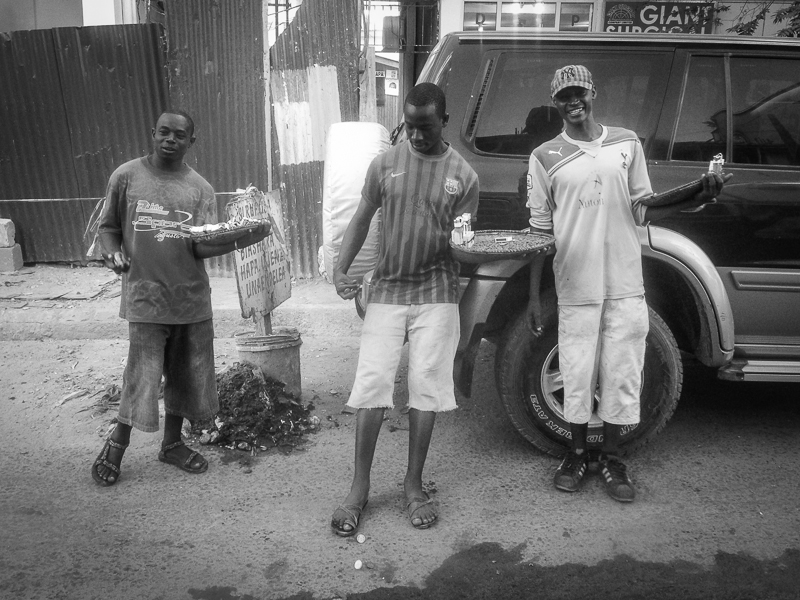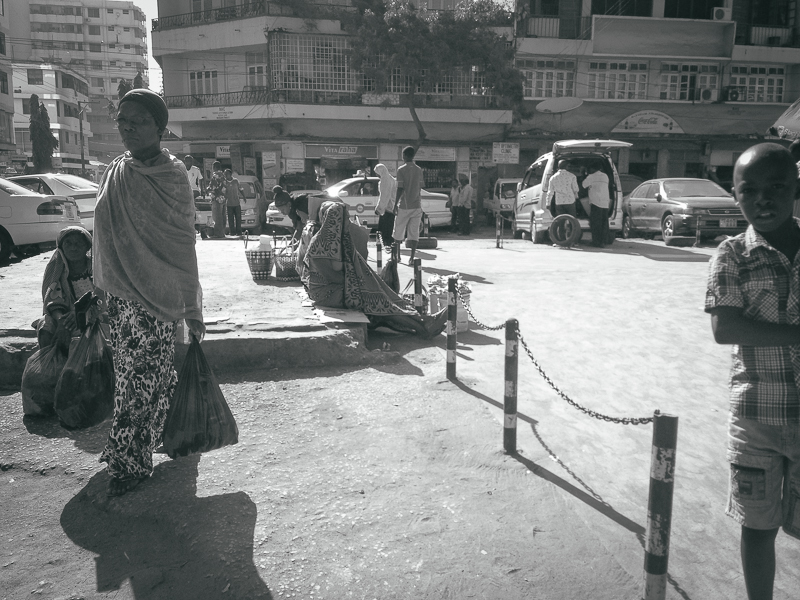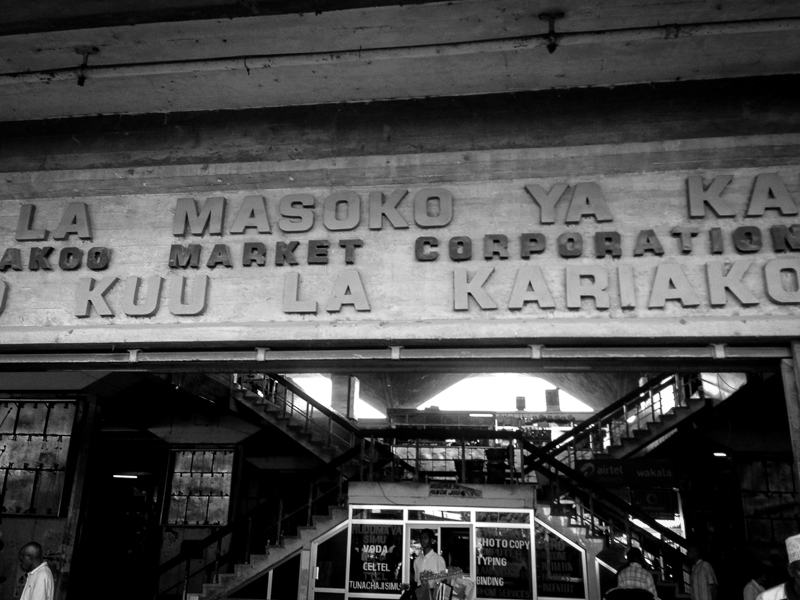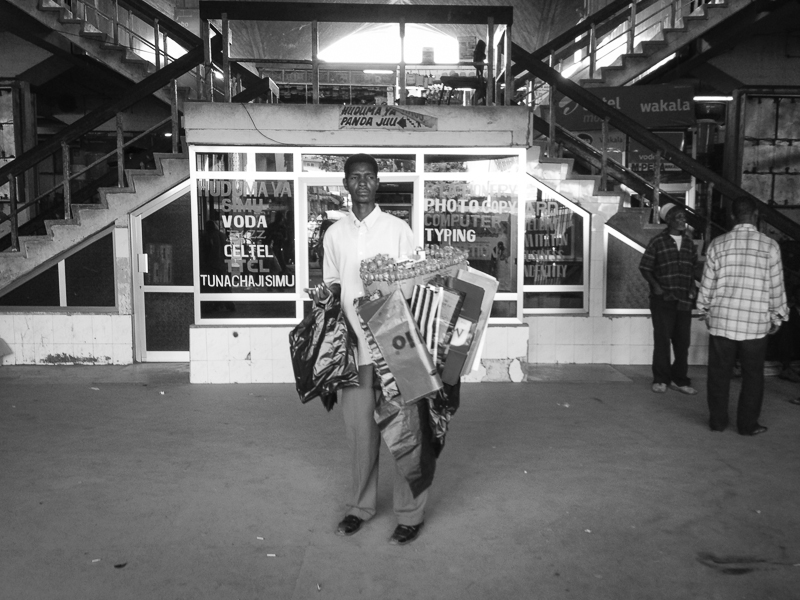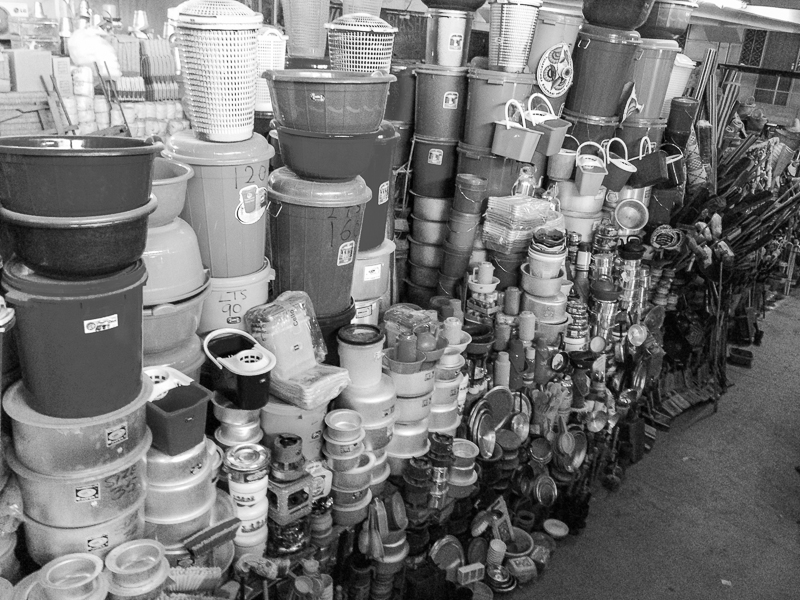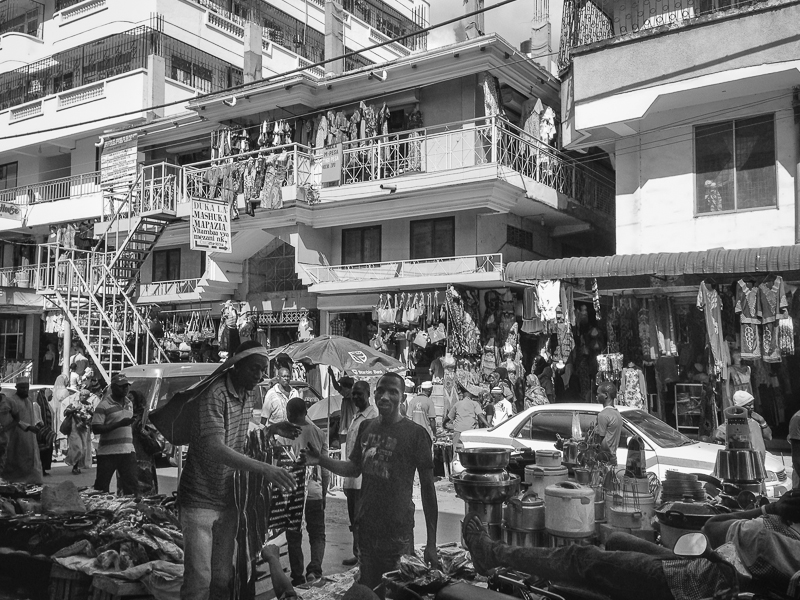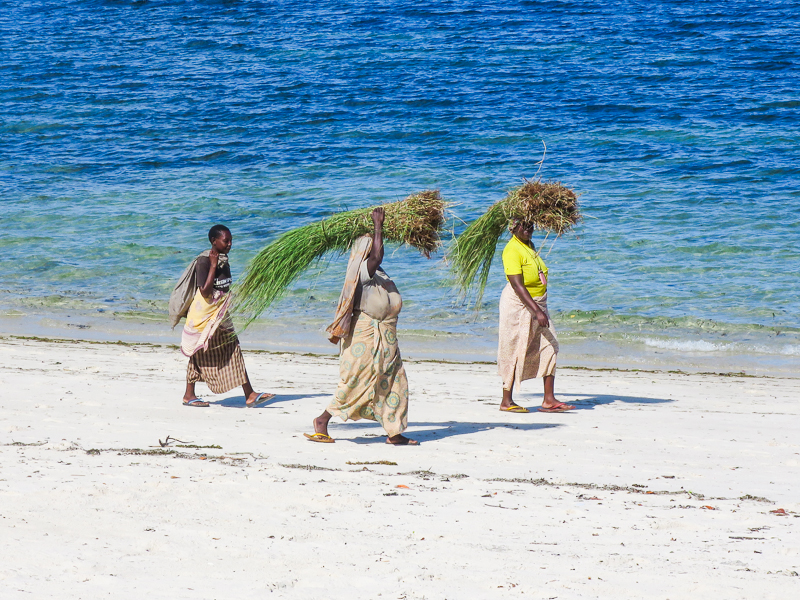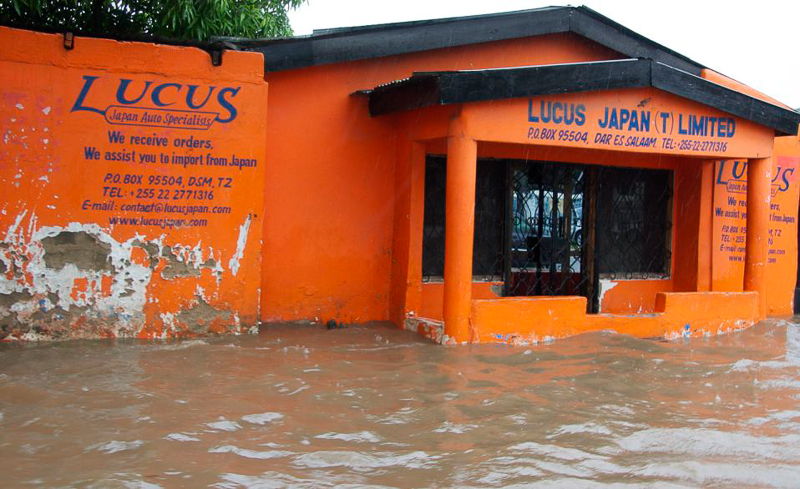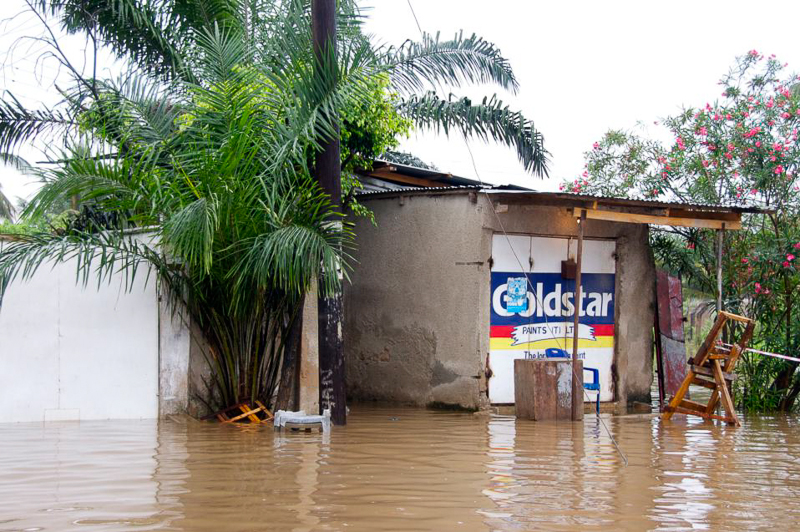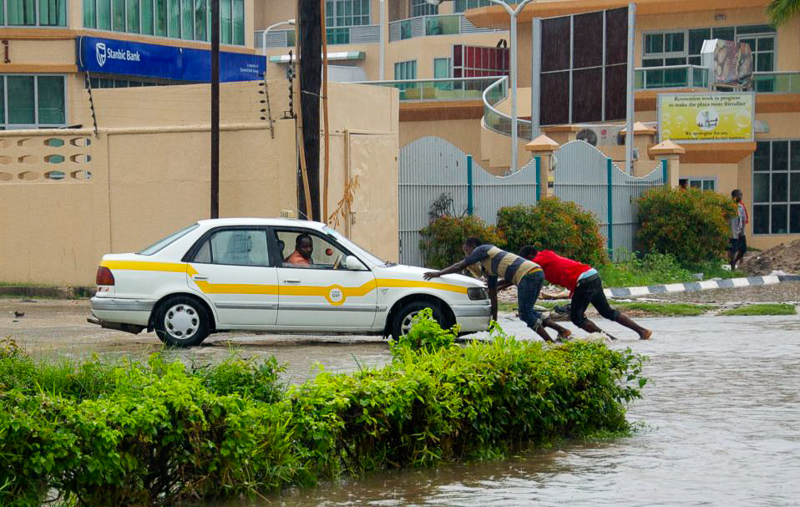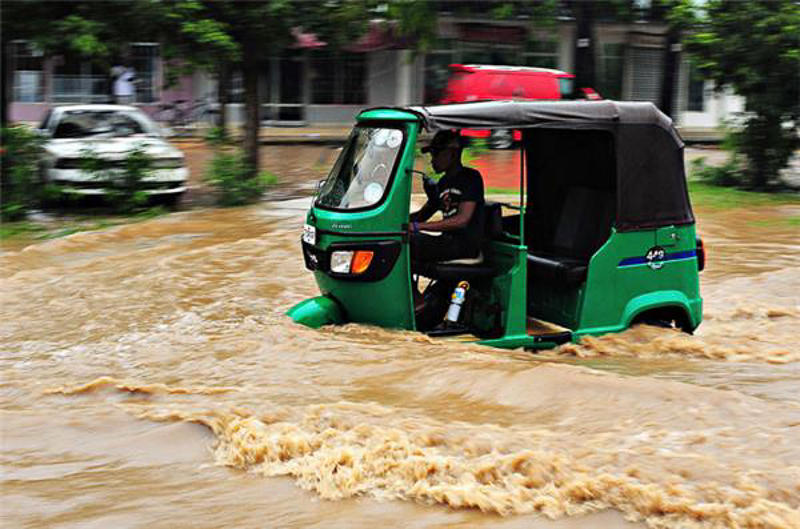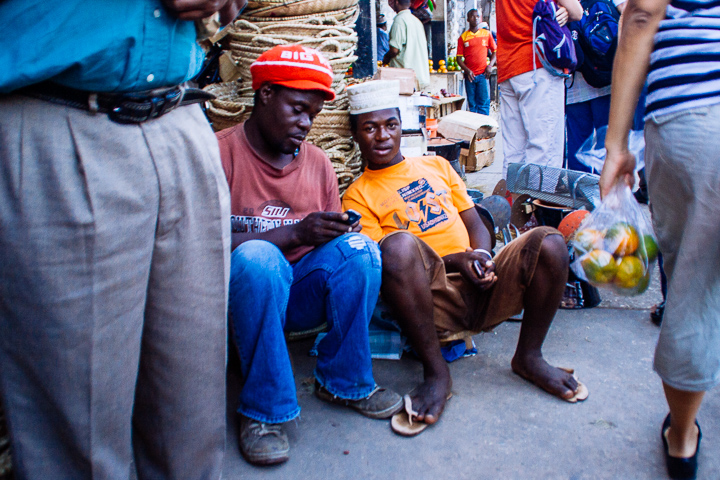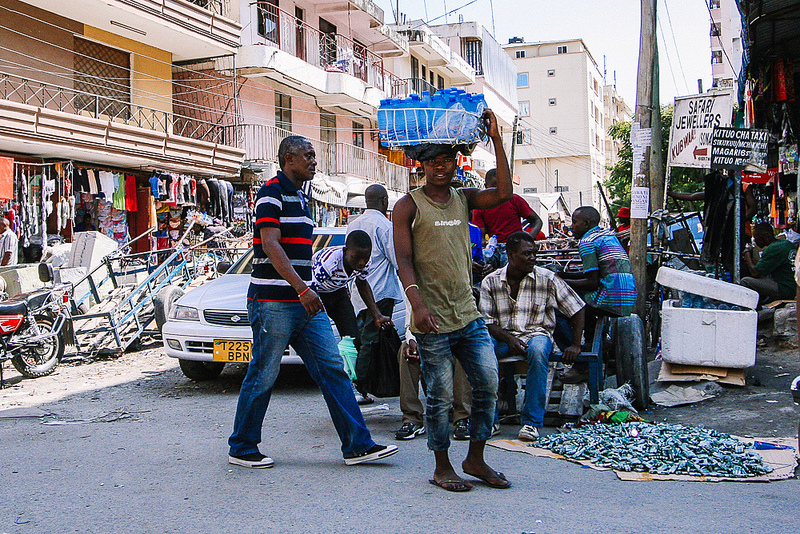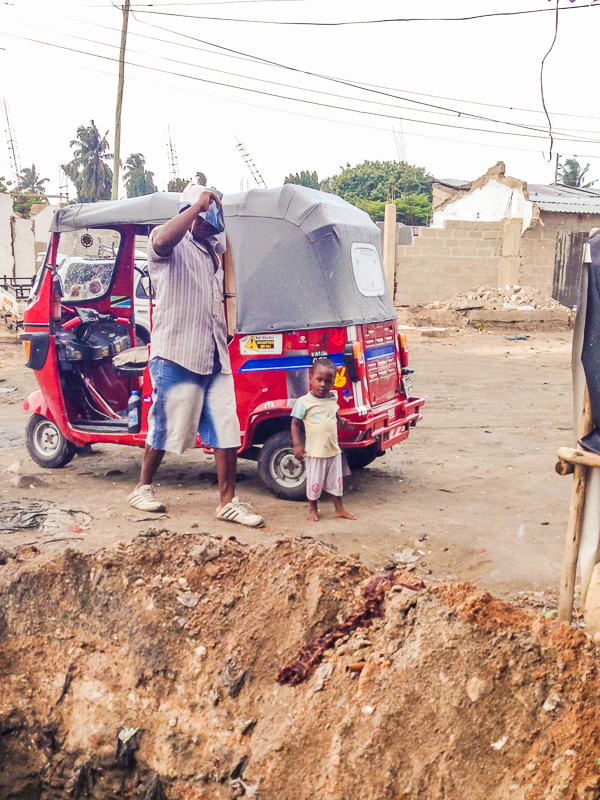Dar es Salaam’s most famous market area Kariakoo, which is so big and popular that it lends its name to an entire neighborhood. Here, pared down to Black and White:
Category Archives: People of Africa
Saturday Series / No. 40
04’05’14 >> Ladies on Kilwa beach. I twish I could document all the things that I’ve seen Tanzanians carry on their heads.
This photo was taken last Sunday, when a few friends and I were lazing on Kilwa beach over a three-day weekend. More info and pictures about Kilwa coming up in a couple posts next week!
It Rains Down in Africa
At first, the rains here in Africa (cue Toto) seemed completely unlike the monsoon rains of Asia, as they occurred with far lesser frequency and for shorter periods of time. Here, at first, the rainy season meant something less palpable than a few monsoon months; an ambiguous length of time where downpours of rain might occur at oddly short intervals, interspersed between periods of beautiful blue skies. The rains didn’t come everyday, and hardly for more than fifteen minutes at a time.
That was at first. And indeed, for the nine months I was first here, Dar’s ‘rainy’ weather was like this, all the way until two weeks ago. Then for four nights in a row (and during some mornings), rain thundered on rooftops, conveniently pausing during most of the daytime hours but inconveniently coming back again each evening and flooding homes, businesses, and roads. Medical supplies washed up on our beloved Yacht Club’s typically pristine beach. Our household staff’s homes in the poorer areas of town washed over. Typical 20 minute commutes extended to 1.5 hours. It was the rainiest I’ve seen Dar in my near one-year living here.
This is when I am reminded—despite the fact that I can find Nutella on my supermarket shelves—that I am living in a 3rd world country. Severe lack of infrastructure and planning caused what would be a nuisance in America: four days of rain, to render much of the city frustratingly unaccessible. And when I say a lack of infrastructure, I’m not talking about the fact that we need to pave a stretch of road; I’m talking about the need to create complicated irrigation systems, implement systems of drainage, and re-map entire communities and their layouts.
Last week, I felt terrible pangs of irony as I watched rain water pool into muddy pits and sloshing about the sides of the roads. In a country where untainted water is scarce, there it was just falling out of the sky, potentially available for anyone who could collect it, but instead wreaking havoc to the same folks that desperately needed it. It seemed like the most vengeful example of the snarky comeback, ‘you get what you ask for’.
It’s been raining a little more lately, not for four straight nights, but on most days viscious downpours for fifteen minutes, half an hour, a few times a day. This morning I left the house, looked at the bright blue sky, and forwent my umbrella. Three hours later sitting in a second-story coffee shop, I thought we were being attacked by flying monkeys on the roof (it was just, disconcertingly, very VERY loud rain). Bless the rains in Africa.
I don’t have any of my own photos of the rains and flooding it may cause here in Dar, but in order of appearance the photos are from 1), 2), and 3) a blog I just came across called ‘View From Dar‘ (no longer updated), 4) Al Jazeera, from a feed with weather photos from across the world, and 5) an AllAfrica.com article from the floods last year
Saturday Series / No. 35
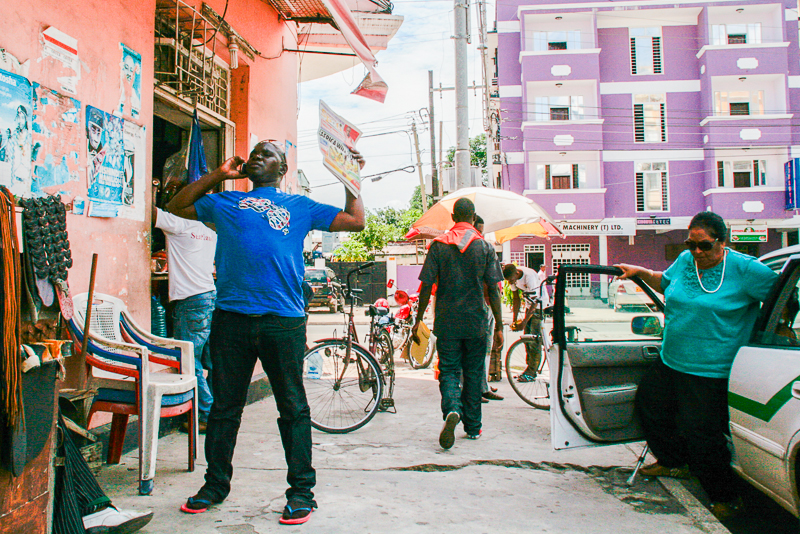
03’08’14 >> So many things going on here; A typical City Centre experience
Went to City Centre’s Uhuru Street today, where a concentration of textile and fabric wholesalers are located. It’s nothing like the wholesale markets in China, but I got a pretty good spread of fabrics anyway (but you guys know, when do I ever have a tough time buying things?). As always, City Centre fascinates me to no end. I love this picture because it could very well be three separate pictures, all on their own. This guy on the left is something else.
The Tanzanian Handshake
My favorite part of learning any language (aside from that “aha!” moment when you figure out how a mess of words fit together into an actual sentence) is in the very beginning, where you don’t know yes from no or stop from go, but regardless you start by learning basic salutations and greetings. There are quite a few unique and funny ways that every culture uses to say ‘hello’, and Tanzania is no exception.
Some of these greetings are teachable. For example, you can drill a Chinese kid named God (true story) to greet his friends with “wussup”, so that he won’t stop saying the word no matter who he meets, but regardless at every utterance of “wussup” you will smile, God will smile, and everyone who hears will smile.
The physical greetings, though, those always throw me for a loop. Do I kiss once, or twice, or three times? Do I look you in the eye when I bow, or at your feet? Do I curtsey, or touch your feet, give you a high-five? Am I allowed to touch you, and if so, where? Am I exempt because I am so obviously a foreigner? Can someone just tell me what to do?!
Here in Tanzania, in addition to a very long roster of verbal greetings one must memorize, there are physical cues one must master when greeting a local. For example, the different forms of handshake that are always welcome, or more often, expected.
There’s the mutual-grabbing-of-the-wrists handshake, although I’ve only seen this a few times. More popular is the three-switch-up-handshake, where start with a soft cupping handshake with your fingers facing down, then switch quickly to a handshake facing up, and then switch facing back down, leading me to think of it as the “secret-clubhouse” handshake. Sometimes this handshake is done slow and leisurely, others more quickly where the second switch is barely even existent. Another common one is the handshake-sans-shake, but rather just two hands that meet in the middle and barely grasp each other, then remain as such for the first 10 seconds of a conversation bobbing up once or twice as if to say casually, “oh yeah, this is a handshake”.
Unlike America’s obsession with a firm handshake, the Tanzanian handshake is usually limp and noodle-y. I’m learning first hand–no pun intended–how to offer my hand, ever-so gently, to each familiar face I meet. I’m learning how not to grasp tightly, as I was conditioned in the States, but rather to barely bend my fingers around that of my counterpart. I’m learning how ten more seconds of holding hands with an almost-stranger is a sign of respect in this culture.
My favorite fruit guy at my market, John, smiles when he sees me. He stands up from a usual napping position to say, “Habari! Jessie, Karibu!” and stretches out his hand with a wide grin. After he takes my hand he doesn’t let go, he proceeds to ask what I want for the day. We continue a conversation–about mangoes, about avocados, about these weird new pears with rough skins that he got in recently–all while this kind man with a huge belly is holding my hand. At first it seemed like forever that this strange man was holding my hand, but I’ve since gotten used to it.
The guy who sells me chicken feed hollers at me, “Mama, Karibu!” from afar. It’s raining out, so he has some sort of old t-shirt or rag over his head which serves the dual purpose of keeping rain away from his eyes as well as provide padding when he hoists the 50kg bag of chicken feed onto his head to carry to my car. Before he grabs my bag of feed, though, he comes over to me and takes my hand. Mama, Habari? he asks. We exchange pleasantries, ‘Habari za kazi?’ How is work? ‘Habari za familia?’ How is your family? We’re still holding hands, slowly shaking up and down.
The guy at the fish market knows my car by now, and it seems like the other guys barely bother to get up as quickly as he does when I approach. ‘Hi, sista!’ He yells. ‘How are you’, he says in accented English, the melodic sing-song way that I’ve recognized the Swahili accent to be. He’s a young guy, who wears a red Arsenal jersey almost every single time I see him, and he initiates a three-switch-up-secret-style handshake.
I think back to my hometown in California, where while growing up I must have seen the same cashier at Safeway over and over, and over again some hundreds of times (and still do, when I visit my parents), yet there is nary a feign of recognition–on either of our parts. Here in Tanzania, these limp and barely-there handshakes, these weird wrist-grappling methods of saying hello, and these learned handshakes that make me think I’m in a special club–they do more than simply say “hi”, and they’re certainly a language all their own.
Saturday Series / No. 26
01’04’14 >> And then there were 8
Our third chicken in three months died last night, and we finally did what we should have three months ago and found a “vet” (this baby-faced, earbud wearing kid). It’s actually a Madawa ya Mifua, which is a livestock clinic of sorts, and this fella was able to open up our little two-month chick to provide us with a diagnosis. WORMS! Despite third-world style digs, this guy and another woman were incredibly knowledgeable and helpful. Don’t judge a book by it’s cover.
Since you can’t see it clearly, we took our dead chick to the vet in a Hello Kitty plastic bag. My point is, I’m sure he made assumptions about us, too.

